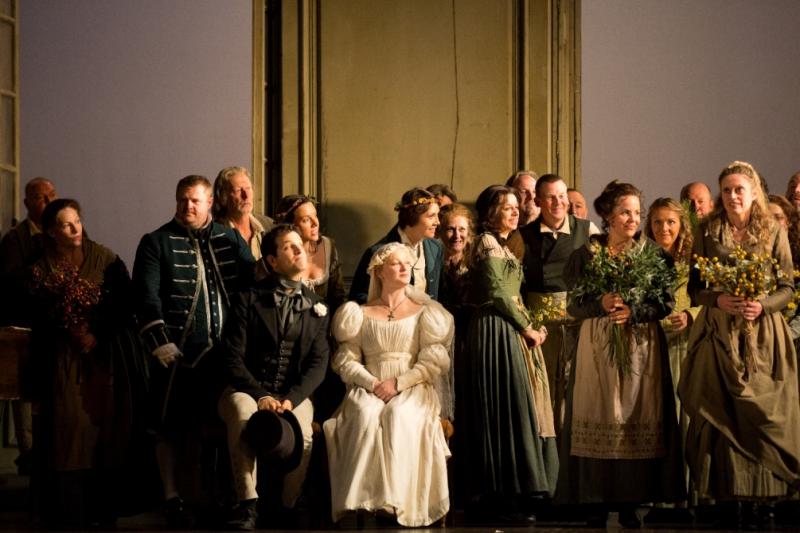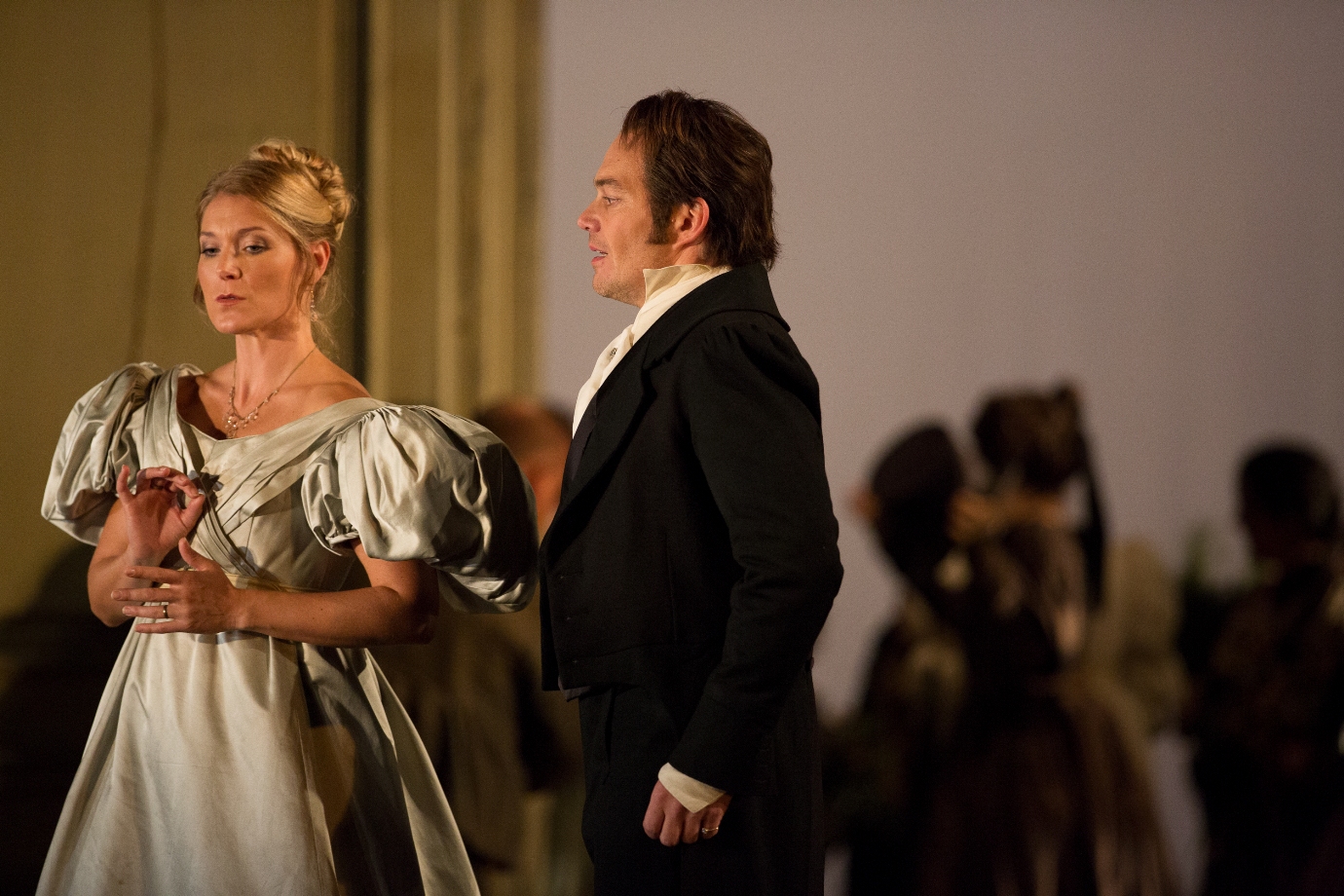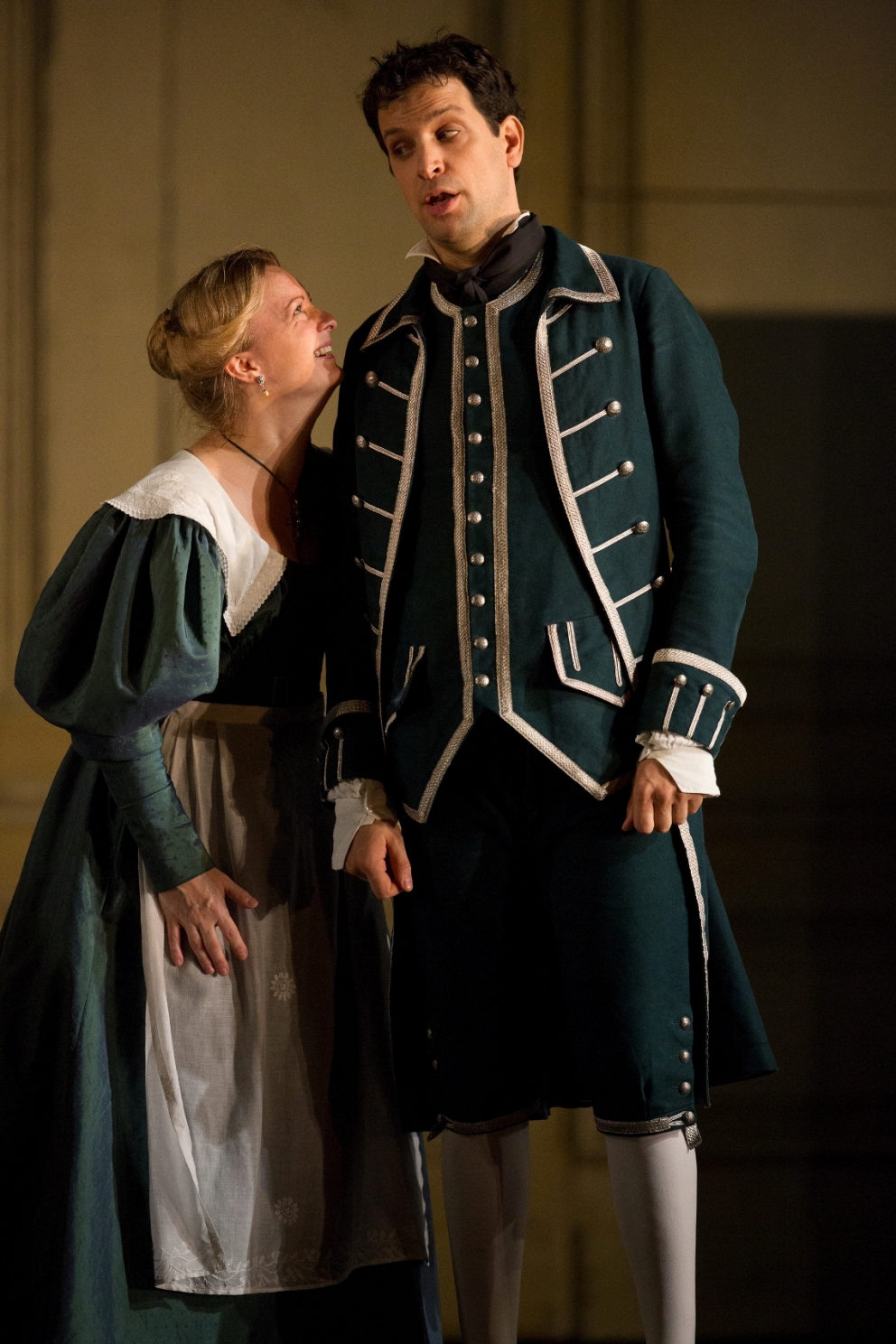Le nozze di Figaro, Royal Opera | reviews, news & interviews
Le nozze di Figaro, Royal Opera
Le nozze di Figaro, Royal Opera
Servants outshine nobles in a hard-pressed revival of opera's greatest comedy

Revivals, especially at Covent Garden, too often wrong-foot high expectations.
The ensemble needs to be as near perfect as it can be. Here the Almavivas were outshone by their servants – seriously so in the charisma bypass of Christopher Maltman’s Count. Character might have been loaned him by the long hair and moustache of Grandage’s late Sixties hipster, but that wouldn’t have concealed the premature roughening of the voice which left Gardiner and the orchestra to provide focused fury in his vengeance aria.
 Maria Bengtsson (pictured right with Maltman) rose to her big number, "Dove sono", with warm soft singing and a radiant top, but it felt by comparison hard-pressed in Gardiner’s authentic-style approach – Act Two’s “Porgi, amor” even more so – and despite aristocratic bearing her tendency, like Maltman, to sing under the note in sometimes listless recitative and the often cloudy sound reduced her impact. Slightly flat of voice, too, was Renata Pokupić’s low-impact Cherubino, though she/he had one good stage moment, when Susanna and the music fizz to get the boy out of an awkward situation and he’s rigid with terror.
Maria Bengtsson (pictured right with Maltman) rose to her big number, "Dove sono", with warm soft singing and a radiant top, but it felt by comparison hard-pressed in Gardiner’s authentic-style approach – Act Two’s “Porgi, amor” even more so – and despite aristocratic bearing her tendency, like Maltman, to sing under the note in sometimes listless recitative and the often cloudy sound reduced her impact. Slightly flat of voice, too, was Renata Pokupić’s low-impact Cherubino, though she/he had one good stage moment, when Susanna and the music fizz to get the boy out of an awkward situation and he’s rigid with terror.
Lucy Crowe, my singer of the year so far for her sublime Handel in Göttingen, threw the book of tricks at Susanna, as if not quite trusting the production: too much hand-waving and flouncing at first was pulled into focus for the disciplined and resourceful servant she needs to be in the second and third acts. Vocally she coloured so much so beautifully: I’m glad Gardiner allowed her and not the Countess the upper line in the Act Two trio, and by that stage the charm had really begun to work with the music-theatre number to which Susanna dresses up Cherubino (how could anyone with half an ear think this weak, as many commentators have?) Again, though, Gardiner’s unyielding conducting failed to let the ineffable garden serenade breathe as it should, though he did give Crowe licence for one golden note of pure ecstasy, the last long F.
 By that stage Luca Pisaroni (pictured left with Crowe) - already proven a finer servant than his master in Glyndebourne's 2010 Don Giovanni - had also struck warmth with his relatively monochrome but handsome bass-baritone. Thank goodness these two's last-minute role play livened up the final masquerade, stone dead up to this point in the weakest act visually of McVicar’s otherwise stylish post-Napoleonic setting. Their opening duets established the role of anger and distress in the true partnership that’s already there in Mozart’s instant dramatic miracle.
By that stage Luca Pisaroni (pictured left with Crowe) - already proven a finer servant than his master in Glyndebourne's 2010 Don Giovanni - had also struck warmth with his relatively monochrome but handsome bass-baritone. Thank goodness these two's last-minute role play livened up the final masquerade, stone dead up to this point in the weakest act visually of McVicar’s otherwise stylish post-Napoleonic setting. Their opening duets established the role of anger and distress in the true partnership that’s already there in Mozart’s instant dramatic miracle.
The imposing presences of Helene Schneiderman’s randy Marcellina, Carlos Chausson’s fulminating Bartolo and Jean-Paul Fouchécourt’s camp music-master should have got more genuine laughs – and this time I’d have welcomed Marcellina’s Act Four aria, cut as usual – but the production made them try too hard (again, I think of the equivalent scenes at Glyndebourne and sigh).
If only Gardiner had unwound to cast a rosy glow over Figaro’s reconciliation with his unexpected parents in the great Sextet. His overture fizzed, with bright brass – not once did I look at the superfluous business on stage – and there were plenty of illuminating orchestral details: the sly violas as the Count uncovers Cherubino, the string bristlings in the Act Two finale, the accents of the Fandango which made up for the lack of dance on stage. Yet, though undeserving of the loud curtain-call booing behind me - no one should be subjected to that - he didn’t seem to be in perfect sympathy with the singers. The glowing humanity that should surround each and every figure in the greatest operatic comedy of all time only fitfully glimmered.
rating
Explore topics
Share this article
more Opera
 Aci by the River, London Handel Festival, Trinity Buoy Wharf Lighthouse review - myths for the #MeToo age
Star singers shine in a Handel rarity
Aci by the River, London Handel Festival, Trinity Buoy Wharf Lighthouse review - myths for the #MeToo age
Star singers shine in a Handel rarity
 Carmen, Royal Opera review - strong women, no sexual chemistry and little stage focus
Damiano Michieletto's new production of Bizet’s masterpiece is surprisingly invertebrate
Carmen, Royal Opera review - strong women, no sexual chemistry and little stage focus
Damiano Michieletto's new production of Bizet’s masterpiece is surprisingly invertebrate
 La scala di seta, RNCM review - going heavy on the absinthe?
Rossini’s one-acter helps young performers find their talents to amuse
La scala di seta, RNCM review - going heavy on the absinthe?
Rossini’s one-acter helps young performers find their talents to amuse
 Death In Venice, Welsh National Opera review - breathtaking Britten
Sublime Olivia Fuchs production of a great operatic swansong
Death In Venice, Welsh National Opera review - breathtaking Britten
Sublime Olivia Fuchs production of a great operatic swansong
 Salome, Irish National Opera review - imaginatively charted journey to the abyss
Sinéad Campbell Wallace's corrupted princess stuns in Bruno Ravella's production
Salome, Irish National Opera review - imaginatively charted journey to the abyss
Sinéad Campbell Wallace's corrupted princess stuns in Bruno Ravella's production
 Jenůfa, English National Opera review - searing new cast in precise revival
Jennifer Davis and Susan Bullock pull out all the stops in Janáček's moving masterpiece
Jenůfa, English National Opera review - searing new cast in precise revival
Jennifer Davis and Susan Bullock pull out all the stops in Janáček's moving masterpiece
 theartsdesk in Strasbourg: crossing the frontiers
'Lohengrin' marks a remarkable singer's arrival on Planet Wagner
theartsdesk in Strasbourg: crossing the frontiers
'Lohengrin' marks a remarkable singer's arrival on Planet Wagner
 Giant, Linbury Theatre review - a vision fully realised
Sarah Angliss serves a haunting meditation on the strange meeting of giant and surgeon
Giant, Linbury Theatre review - a vision fully realised
Sarah Angliss serves a haunting meditation on the strange meeting of giant and surgeon
 Der fliegende Holländer, Royal Opera review - compellingly lucid with an austere visual beauty
Bryn Terfel's Dutchman is a subtly vampiric figure in this otherworldly interpretation
Der fliegende Holländer, Royal Opera review - compellingly lucid with an austere visual beauty
Bryn Terfel's Dutchman is a subtly vampiric figure in this otherworldly interpretation
 The Magic Flute, English National Opera review - return of an enchanted evening
Simon McBurney's dark pantomime casts its spell again
The Magic Flute, English National Opera review - return of an enchanted evening
Simon McBurney's dark pantomime casts its spell again
 Così fan tutte, Welsh National Opera review - relevance reduced to irrelevance
School for lovers not much help to the singers
Così fan tutte, Welsh National Opera review - relevance reduced to irrelevance
School for lovers not much help to the singers
 Manon Lescaut, English Touring Opera review - a nightmare in too many ways
Grotesque staging sabotages Puccini's breakthrough tragedy
Manon Lescaut, English Touring Opera review - a nightmare in too many ways
Grotesque staging sabotages Puccini's breakthrough tragedy

Add comment